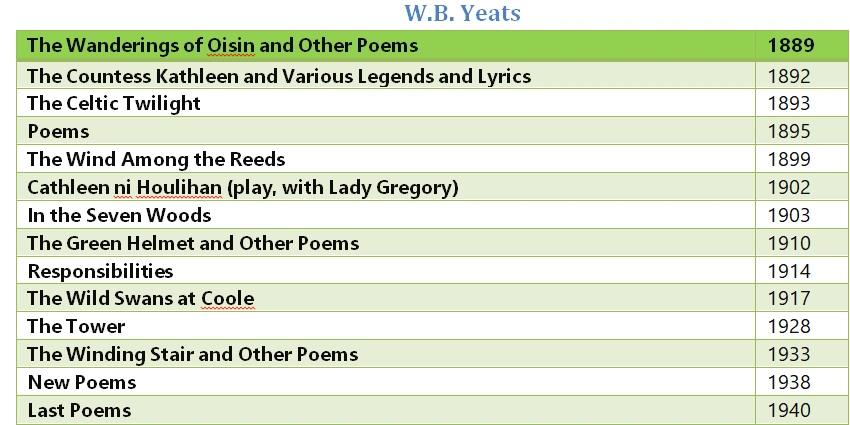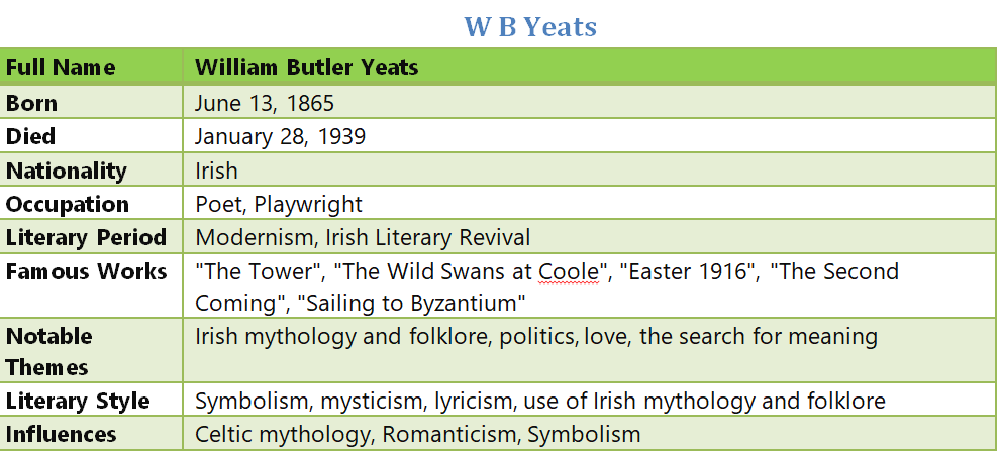Collection of important MCQs on W B Yeats
On the marble table-top.” This line is taken from which of the following poem of Yeats?
(A) Byzantium
(B) Blood and the Moon
(C) Coole Park
(D) Vacillation
Question’s Answer: Vacillation

The symbols used by W.B. Yeats are difficult to understand because:
(A) They are too intricate
(B) They are derived from Scottish legends
(C) They are derived from obscure Irish mythology
(D) They are derived from unfamous sources
Question’s Answer: They are derived from obscure Irish mythology
“My fiftieth year had come and gone,
I sat a solitary man,
In a crowded London shop,
An open book and empty cup
W.B. Yeats was a ______ .
(A) Anglo-Scotch poet
(B) Anglo-Indian poet
(C) Anglo-Roman poet
(D) Anglo-Irish poet
Question’s Answer: Anglo-Irish poet
What is Yeats’s The Land of Heart’s Desire?
(A) A drama in One Act
(B) A drama in three Acts
(C) A long narrative poem
(D) A prose treatise
Question’s Answer: A drama in One Act
What is Yeats’s Ideas of Good and Evil?
(A) A Collection of Lyrics
(B) A Collection of essays
(C) A Collection of tales
(D) A Collection of Odes
Question’s Answer: A Collection of essays

Which is a poem not created and written by Yeats?
(A) The Statues
(B) A Bronze Head
(C) The Untilled Field
(D) Vacillation
Question’s Answer: The Untilled Field
“Wisdom is the property of the dead,
A something incomparable with life;
and power Like everything that has the stain of blood,
A property of the living.”
This line is taken from which of the following poem of Yeats?
(A) The Three Bushes
(B) Lapis Lazuli
(C) The Gyres
(D) A Prayer for Old Age
Question’s Answer: A Prayer for Old Age
Countess Cathleen is a drama written by Yeats. In what linguistic form is it written?
(A) In Rhyming Verse
(B) In prose
(C) In prose-poetry
(D) In Free Verse
Question’s Answer: In prose
Is Yeats primarily a-
(A) Satirist
(B) Imagist
(C) Symbolist
(D) Idealist
Question’s Answer: Symbolist
“… for peace comes dropping slow, Dropping from the veils of the morning to where the cricket sings.”
This line is taken from which of the following poem?
(A) Byzantium
(B) Coole Park
(C) The Secret Rose
(D) The Lake Isle of Innisfree
Question’s Answer: The Lake Isle of Innisfree
Yeats’s poem When You Are Old is addressed to:
(A) His wife
(B) His sister
(C) Robert Bridges
(D) His beloved Maud Gonne
Question’s Answer: His beloved Maud Gonne
What is the idea/theme of Sailing to Byzantium?
(A) Mortality of man
(C) A Utopian vision
(B) Land of ideal vision
(D) Eternity of life
Question’s Answer: Eternity of life
What is Yeats’s Reveries Over Childhood and Youth?
(A) An autobiographical treatise
(B) A satirical treatise
(C) A reflective treatise
(D) A prose-work
Question’s Answer: An autobiographical treatise
Which is a poem written by Yeats?
(A) Esther Waters
(B) The Day’s Work
(C) Palicio
(D) The Second Coming
Question’s Answer: The Second Coming
W.B. Yeats has written a poem The Lake Isle of Innisfree. Where is Innisfree situated?
(A) It is only an imaginary Island
(B) It is situated near the eastern coast of England
(C) It is situated in Lough Gill
(D) It is situated near the western coast of England
Question’s Answer: It is situated in Lough Gill
Yeats’s poem Coole Park is related with the poet’s association with which of the following?
(A) The poet’s old-age memories
(B) Irish social life
(C) Lady Gregory
(D) The poet’s zest for life
Question’s Answer: Lady Gregory
One of the most important symbols is in Yeats’ poems is:
(a) Sky symbol
(b) Child symbol
(c) Bird’s symbol
(d) None of A, B, and C
Question’s Answer: Bird’s symbol
Arthur Simons dedicated his book The Symbolist Movement in Literature to:
(a) T.S Eliot
(b) Ezra Pound
(c) W.B. Yeats
(d) None of A, B, and C
Question’s Answer: W.B. Yeats
In Yeats’ poems, “Rose” symbolizes:
(a) Creativity
(b) Apparent Beauty
(c) Intellectual Beauty
(d) None of A, B, and C
Question’s Answer: Intellectual Beauty
Which is not the work of Yeats?
(a) The Second Coming
(b) The Waste Land
(c) Among School Children
(d) None of A, B, and C
Question’s Answer: The Waste Land
In the poem “Among School Children” by Yeats ‘Dance’ is the symbol of:
(a) Beauty
(b) Calm
(c) Calm
(c) Unity
(d) None of A, B, and C
Question’s Answer: Unity
In Yeats’ Poem “Sailing To Byzantium”, “Byzantium” is the symbol of:
(a) Perfect world
(b) Unity
(c) Beauty
(d) None of A, B, and C
Question’s Answer: Perfect world
W.B. Yeats’ parents were:
(a) Painters
(b) Doctors
(c) Engineers
(d) None of A, B, and C
Question’s Answer: Painters
Which following is not the contemporary of W.B. Yeats?
(a) Chaucer
(b) T.S. Eliot
(c) Ezra Pound
(d) None of A, B, and C
Question’s Answer: Chaucer
Yeats pass away in:
(a) Germany
(b) America
(c) France
(d) None of A, B, and C
Question’s Answer: France
Who was Lady Gregory?
(a) Callaborator of Yeats
(b) Yeats’ Sister
(c) Yeats’ Mother
(d) None of A, B, and C
Question’s Answer: Callaborator of Yeats
One of the earlier poems of W.B. Yeats is:
(a) The Mask
(b) In the Serene Woods
(c) The Tower
(d) None of A, B, and C
Question’s Answer: In the Serene Woods
W.B. Yeats was influenced by:
(a) TS Eliot
(b) W.H. Auden
(c) Ezra Pound
(d) None of A, B, and C
Question’s Answer: Ezra Pound
Yeats got married when he was:
(a) Fifty-one
(b) Fifty-three
(c) Fifty-two
(d) None of A, B, and C
Question’s Answer: Fifty-two
Yeats was a member of the Irish:
(a) Senate
(b) Assembly
(c) Parliament
(d) None of A, B, and C
Question’s Answer: Senate
Yeats stupass away at the School of Art in:
(a) Dublin
(b) France
(c) America
(d) None of A, B, and C
Question’s Answer: Dublin
In “Among School Children” while thinking of Maud Gonne being old, Yeats started thinking of his:
(a) Old Age
(b) Childhood
(c) Youth
(d) None of A, B, and C
Question’s Answer: Youth
Aristotle was the tutor of:
(a) Alexander the Great
(b) Socrates
(c) Plato
(d) None of A, B, and C
Question’s Answer: Alexander the Great
Yeats’ poetic career spans the period of:
(a) Seventy years
(b) Sixty years
(c) Over fifty years
(d) None of A, B, and C
Question’s Answer: Over fifty years
Which school Yeats visited in 1926?
(a) Stafford School
(b) Beacon House
(c) Waterford Convent
(d) Inn School
Question’s Answer: Waterford Convent
With whom Yeats compared Maud Gonne in his poem ” Among School Children”?
(a) Cleopatra
(b) Helen
(c) Mona Liza
(d) None of A, B, and C
Question’s Answer: Helen
The “Second Phase” of Yeats poetry is from:
(a) 1901 to 1914
(b) 1903 to 1913
(c) 1902 to 1912
(d) None of A, B, and C
Question’s Answer: 1903 to 1913
The “Third Phase” of Yeats poetry is from:
(a) 1915 to 1910
(b) 1914 to the mid of 1928
(c) 1915 to 1920
(d) None of A, B, and C
Question’s Answer: 1914 to the mid of 1928
The girl students in the classrooms reminded Yeats’ of:
(a) Lady Gregory
(b) Anne
(c) Maud Gonne
(d) None of A, B, and C
Question’s Answer: Maud Gonne
W.B. Yeats pass away in:
(a) 1950
(b) 1930
(c) 1940
(d) 1939
Question’s Answer: 1939
The “Fourth Phase” of Yeats poetry is from:
(a) 1929 to 1940
(b) The mid of 1928 to 1939
(c) None of A, B, and C
Question’s Answer: The mid of 1928 to 1939
When did the last work of “Collected Plays” of Yeats was published?
(a) 1951
(b) 1954
(c) 1953
(d) 1952
Question’s Answer: 1952
W.B. Yeats was born in:
(a) 1880
(b) 1870
(c) 1875
(d) 1865
Question’s Answer: 1865
Who is the author of the “The Second Coming”?
(a) E. Spencer
(b) W.B. Yeats
(c) TS Eliot
(d) None of A, B, and C
Question’s Answer: W.B. Yeats
W.B. Yeats was a:
(a) Dramatist
(b) Poet and Dramatist
(c) Novelist
(d) None of A, B, and C
Question’s Answer: Poet and Dramatist
Yeats’ poem “A Vision” is:
(a) Political
(b) Mystic
(c) Romantic
(d) None of A, B, and C
Question’s Answer: Mystic
What is the theme of Yeats’ Poem “Sailing To Byzantium”?
(a) Mysticism
(b) Love
(c) Old Age
(d) None of A, B, and C
Question’s Answer: Old Age
The subject of Yeats’ poem “September 1913” is:
(a) Romance
(b) Mythology
(c) Politics
(d) None of A, B, and C
Question’s Answer: Politics
WB. Yeats belonged to the:
(a) 20th Century
(b) 19th Century
(c) 18th Century
(d) 17th Century
Question’s Answer: 20th Century
The last poems of Yeats are steeped in:
(a) Politics
(b) Mysticism
(c) Mythology
(d) None of A, B, and C
Question’s Answer: Mysticism
Yeats’ Poem, “A Pray for my Daughter” is a:
(a) Political
(b) Personal Poem
(c) Mystic
(d) None of A, B, and C
Question’s Answer: Personal Poem
Mythology which Yeats used in his early poems was derived from:
(a) Roman Mythology
(b) Greek Mythology
(c) Irish Heroic Legends
(d) None of A, B, and C
Question’s Answer: Irish Heroic Legends
Yeats’ poem “Easter 1916” deals with the:
(a) Beauty of Maud Gonne
(b) Contemporary history of Ireland
(c) Rise and fall of civilization
(d) None of A, B, and C
Question’s Answer: Contemporary history of Ireland
The “Nobel Prize for Literature” was given to Yeats in:
(a) 1926
(b) 1924
(c) 1925
(d) 1923
Question’s Answer: 1923
Aristotle and Plato were:
(a) Philosophers
(b) Writers
(c) Doctors
(d) None of A, B, and C
Question’s Answer: Philosophers
The main theme of Yeats’ poem “Among School Children” is:
(a) Love
(b) Old age
(c) Relationship of matter and spirit
(d) None of A, B, and C
Relationship of matter and spirit
How many stanzas are there in the poem “Among School Children”?
(a) Five stanzas
(b) Nine stanzas
(c) Eight stanzas
(d) None of A, B, and C
Eight stanzas
In the last stanza of ‘Among School Children’ Yeats compared life to:
(a) Bird
(b) Heaven
(c) A Chestnut Tree
(d) None of A, B, and C
A Chestnut Tree
Plato explained the world as the:
(a) Hell
(b) Shadow of God’s ideas
(c) Heaven
(d) None of A, B, and C
Shadow of God’s ideas
“Sailing To Byzantium” was proudly written by:
(a) T.S. Eliot
(b) W.B. Yeats
(c) John Keats
(d) None of A, B, and C
W.B. Yeats
“Pure Poetry” is:
(a) Romantic Poetry
(b) Free from the exterior decoration
(c) Sad Poetry
(d) None of A, B, and C
Free from the exterior decoration
To appreciate Yeats poems one has to be fully conversant with the
(a) Irish Background
(b) Background
(c) American Background
(d) None of A, B, and C
Irish Background
In the last lines of Among School Children” Yeats talked the need of a proper fusion:
(a) Between Body and Soul
(b) Between outer and inner beauty
(c) Between labour and spontaneity
(d) None of A, B, and C
Between labour and spontaneity
The first eight lines of “The Second Coming” sum up the situation of the world after:
(a) World War II
(b) World War-I
(c) (a) & (b)
(d) None of A, B, and C
World War-I
How many women, who influenced Yeats’ poems, came in his life?
(a) One
(b) Five
(c) Four
(d) Two
Two
“Istanbul” was the capital of:
(a) Greece
(b) Roman Empire
(c) France
(d) None of A, B, and C
Roman Empire
How many stanzas are there in ‘Sailing to Byzantium”Y
(a) Four stanzas
(b) Three stanzas
(c) Five stanzag
(d) None of A, B, and C
Four stanzas
Yeats’ beloved name was:
(a) Mary
(b) Maud Gonn
(c) Elizabeth
(d) None of A, B, and C
Maud Gonne
Yeats started writing “Pure Poetry” under Influence of:
(a) The Greek Symbolists
(b) The Roman Symbolists
(c) The French Symbolist and English Aesthetes
(d) None of A, B, and C
The French Symbolist and English Aesthetes
“Byzantium is the old name of
(a) Rome
(b) Greece
(c) Istanbul
(d) None of A, B, and C
Istanbul
Yeats’ poetry can be divided into:
(a) Four phases
(b) Three phases
(c) Two phases
(d) None of A, B, and C
Four phases
The “First Phase” of Yeats poetry is from:
(a) 1886 to 1902
(b) 1885 to 1901
(c) 1885 to 1903
(d) None of A, B, and C
1885 to 1903
How many stanzas are there in “The Second Coming”?
(a) Three stanzas
(b) Two stanzas
(c) Four stanzas
(d) None of A, B, and C
Two stanzas
Yeats poem “The Second Coming” was written in:
(a) 1924
(b) 1922
(c) 1923
(d) 1921
1921
Yeats married in:
(a) 1920
(b) 1918
(c) 1919
(d) 1917
1917
“Responsibilities” by Yeats is the volume of:
(a) Novels
(b) Poems
(c) W.B.Plays
(d) None of A, B, and C
Poems
“The Wind Among the Reeds” was published in which year?
(a) 1899
(b) 1890
(c) 1892
(d) 1900
1899
W B Yeats basic info
| Full Name | William Butler Yeats |
| Born | June 13, 1865 |
| Died | January 28, 1939 |
| Nationality | Irish |
| Occupation | Poet, Playwright |
| Literary Period | Modernism, Irish Literary Revival |
| Famous Works | “The Tower”, “The Wild Swans at Coole”, “Easter 1916”, “The Second Coming”, “Sailing to Byzantium” |
| Notable Themes | Irish mythology and folklore, politics, love, the search for meaning |
| Literary Style | Symbolism, mysticism, lyricism, use of Irish mythology and folklore |
| Influences | Celtic mythology, Romanticism, Symbolism |
W.B. Yeats books names
| The Wanderings of Oisin and Other Poems | 1889 |
| The Countess Kathleen and Various Legends and Lyrics | 1892 |
| The Celtic Twilight | 1893 |
| Poems | 1895 |
| The Wind Among the Reeds | 1899 |
| Cathleen ni Houlihan (play, with Lady Gregory) | 1902 |
| In the Seven Woods | 1903 |
| The Green Helmet and Other Poems | 1910 |
| Responsibilities | 1914 |
| The Wild Swans at Coole | 1917 |
| The Tower | 1928 |
| The Winding Stair and Other Poems | 1933 |
| New Poems | 1938 |
| Last Poems | 1940 |
Famous English Authors MCQs
- William Wordsworth MCQs
- William Shakespeare MCQs
- Robert Browning MCQs
- W B Yeats MCQs
- Edmund Spenser MCQs
- Chaucer MCQs
- John Milton MCQs
- S T Coleridge MCQs
- Lord Byron MCQs
- PB Shelley MCQs
- John Dryden MCQs
- John Keats MCQs
- Charles Dicken MCQs
- Alfred Lord Tennyson MCQs
- Charles Lamb MCQs
- D.H Lawrence MCQs
- Thomas Hardy MCQs
- Matthew Arnold MCQs
- John Galsworthy MCQs
- George Bernard Shaw MCQs
- T.S Eliot MCQs
- Ben Jonson MCQs
- Francis Bacon MCQs
- Alexander Pope MCQs
- Oliver Goldsmith MCQs
- Joseph Addison MCQs
- Dr Samuel Johnson MCQs
- Henry Fielding MCQs
- Sir Walter Scott MCQs
- Jane Austen MCQs
- Dr. Samuel Johnson MCQs
- English Comedy MCQs (Oliver Goldsmith)
- Alexander Pope MCQs (Neo-Classical Age of English Poetry)
- Daniel Defoe MCQs
- Dr. Jonathan Swift MCQs
- Richard Steele MCQs
- English Drama MCQs
- Elizabethan Drama MCQs [14th to 17th century]
- Elizabethan Prose MCQs
More English Literature MCQs
- English Poetry MCQs
- History of English Literature MCQs
- Sentimental Novels MCQs
- Sentimental Poetry MCQs
- Legends Of English Literature MCQs
- English Literature Quiz
- English Literature Important Multiple Choice Questions Answers
- Sons And Lovers by D H Lawrence MCQs
- The Waste Land, A Poem by T. S. Eliot MCQs
- Drama Origin MCQs
- History of the Renaissance Period MCQs
- English Pros MCQs
- Non-Dramtic Poets Of The Elizabethan Age MCQs
- The Cavalier Poets of 17th-century MCQs
- Metaphysical Poets of 17th century MCQs
- Renaissance Period of 14th, 15th, and 16th centuries MCQs
- Puritan Poet MCQs
- Restoration Comedy by William Congreve & Wycherley MCQs
- Satire MCQs – Renaissance Period by John Dryden
- English Essayists MCQs
- Romantic Period of Romantic Poets MCQs
- English language MCQs
- English Humour MCQs [American Literature]
- Early Writers of American Literature MCQs
- History of American Literature MCQs
- American Prose MCQs [English Realism ]
- American English Critics
- New Englanders Authors MCQs
- MCQs on American Literature After Independence
- American Playwrights MCQs
- New American Poetry MCQs
- British English Critics MCQs
- Ancient English literature MCQs
- Important English Literature MCQs for Public Service Commission
- English Literature Repeated Important MCQs
- CSS English Literature MCQs
- History of Early Period MCQs
- The Anglo-Saxon period MCQs
- The Age of Chaucer in the Early Period MCQs
- The Anglo-Norman Period of French Writers MCQs
- Metrical Romances MCQ (Anglo-Saxon Period)
- Revival of Learning MCQs (1400-1550)
- Applied Linguistics MCQs
- Language Change MCQs


